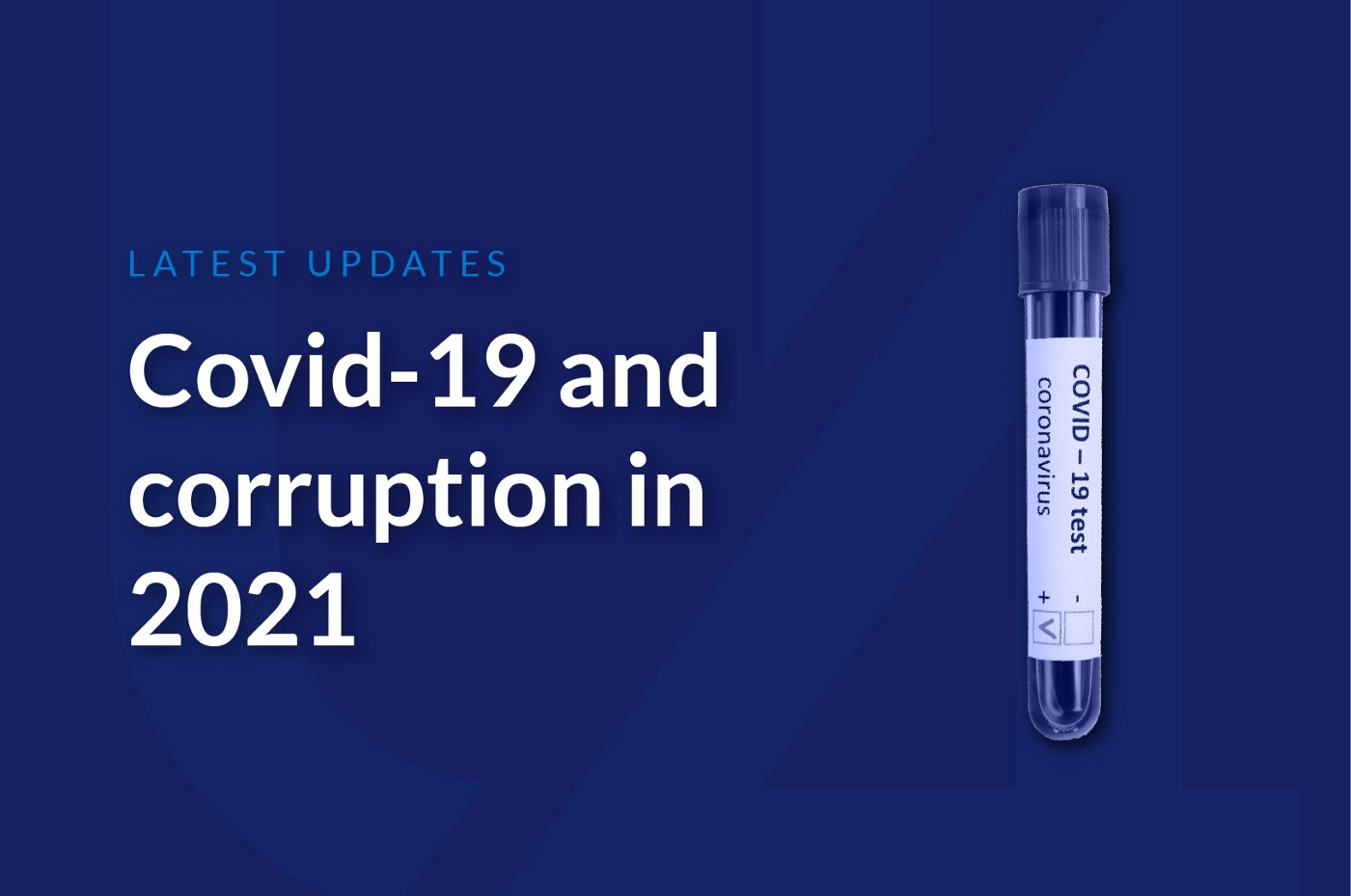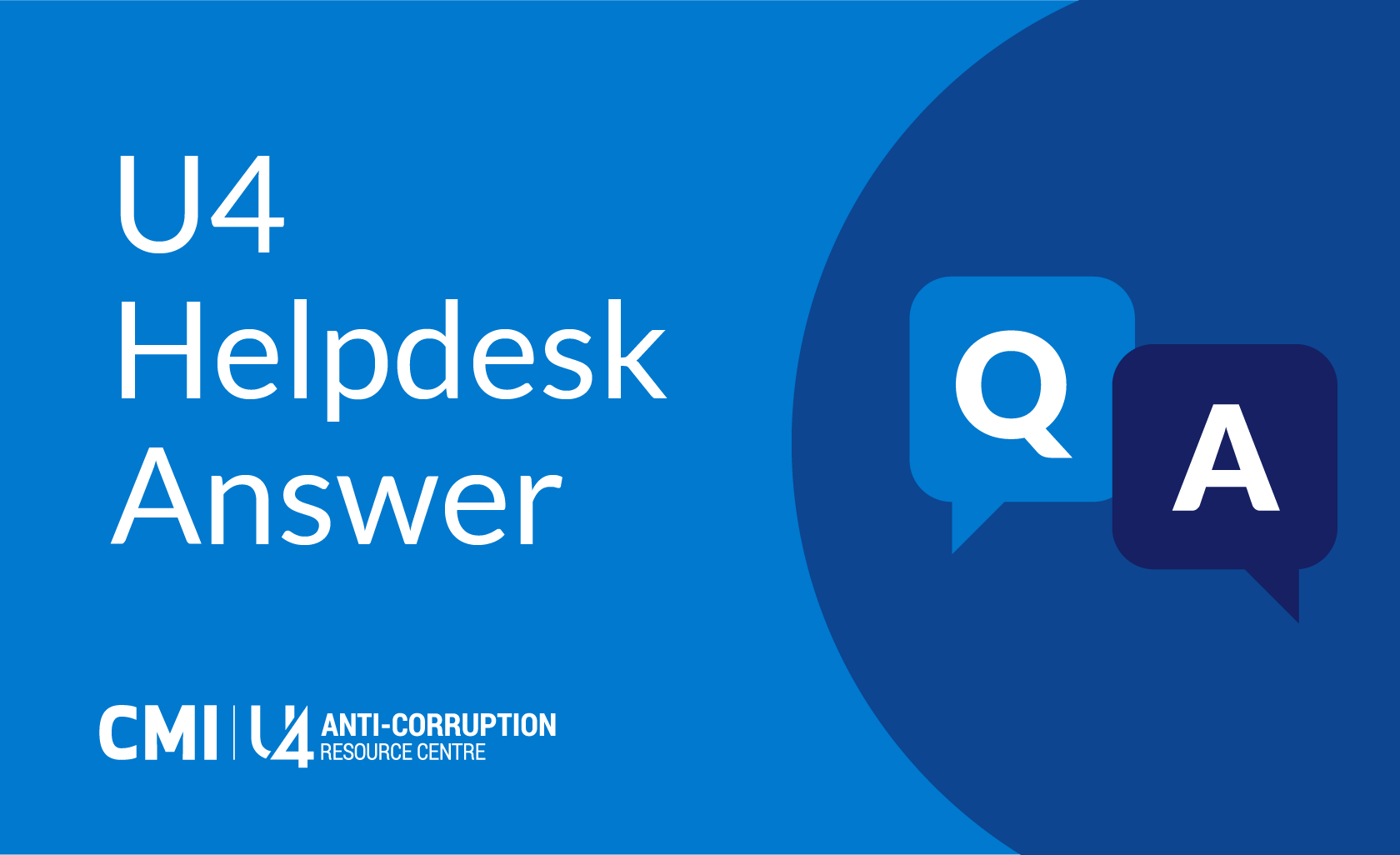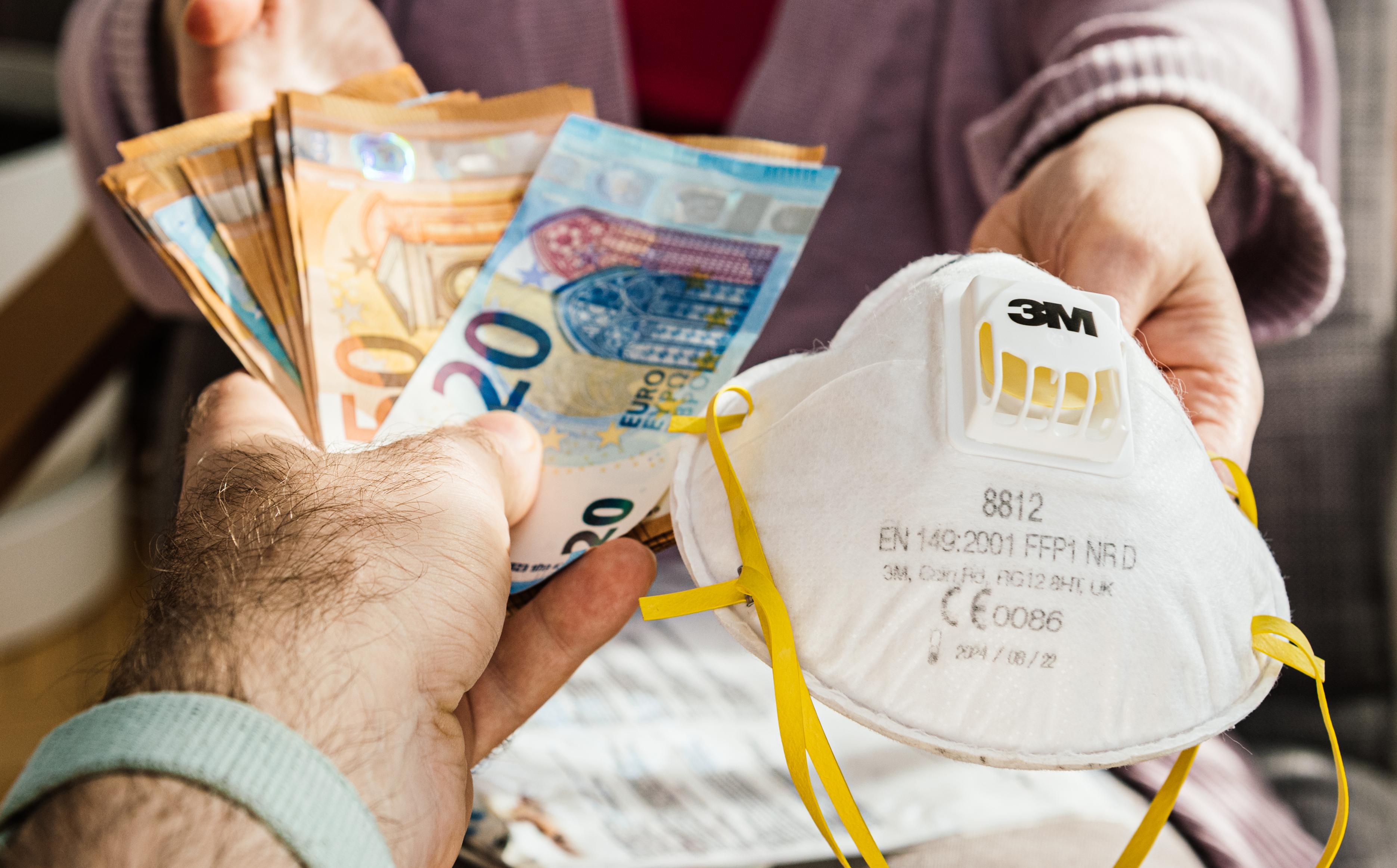Blog
Covid-19 corruption in 2021: January–April developments

This update is part of an ongoing series, where we recount what’s been happening with Covid-19 and corruption in 2021.
In the latest OECD Global Anti-Corruption & Integrity Forum, Mr Giovani Gallo – Chief of Section of the Corruption and Economic Crime Branch at UNODC – condemned the exclusion of anti-corruption measures in the first responses to Covid-19. Since day one of the outbreak, corruption has infiltrated Covid-19 responses around the world, undermining their effectiveness.
So far this year, reports have been emerging rapidly of Covid-related corruption and fraud, giving us a sense of the true cost of corruption during Covid-19. But on a positive note, we are also witnessing more high-level political actors denouncing Covid corruption and taking action.
Here’s our review of what’s been happening in 2021.
January–March 2021
Uncovering corruption (and its costs)
- Financial losses are piling up. In South Africa, the Special Investigative Unit identified corruption as the main cause for the loss of more than US$800 million in procurement contracts during the first months of the pandemic. In Uganda, the latest report by the Auditor General revealed that Shs 55.8 billion (around US$15.2 million) destined for the distribution of Covid-19 relief items is unaccounted for. Zimbabwe’s anti-graft police recently recovered around 40 boxes of Covid-19 test kits valued at thousands of dollars, which were stolen from a hospital in Bulawayo. Malawi faces mismanagement of over 6.2 billion kwacha (about US$8 million) meant for the Covid-19 response.
- Corruption is costing human lives. On 25 March a fire broke out at a Covid care centre in a Mumbai mall, killing ten Covid-19 patients. It is unclear how this centre was allowed to open in a mall that had yet not received an occupancy certificate and whose fire audit was incomplete. BJP leader Devendra Fadnavis has pointed to corruption as the main cause and requested that the Bombay High Court look into the matter.
- Queue jumping is intensifying. Queue-jumping from politicians, senior and high-level government officials, and wealthy individuals has happened in Malaysia, the Philippines, Peru, Ecuador, Argentina, Spain, Poland and Canada, among others.
- Long-standing corruption has eroded public trust in institutions, contributing to vaccine hesitancy. Reports on this have emerged from Ukraine, Afghanistan, Haiti and many countries in Africa.
- This health emergency has increased the obscurity around how countries deal with pharmaceutical companies. A new report from Red Palta found that at least 13 Latin American countries changed their laws to ease the purchase of Covid-19 vaccines. Around 23 laws, decrees and resolutions were enacted, that weakened transparency measures in public contracting, strengthened confidentiality clauses, and gave public immunity to pharmaceutical companies producing Covid vaccines.
- Black markets for substandard, falsified and stolen Covid-19 vaccines are sprouting across the world. There is evidence of this happening in Mexico, the Philippines, South Africa, and Nigeria, among other countries in Latin America, Africa, and Asia.
The good news: there is growing interest in anti-corruption in Covid-19 responses
In 2021 we have witnessed more political leaders coming forward and advocating for anti-corruption in pandemic preparedness and response. Take the USAID nominee Samantha Power and the recently elected Moldovan President Maia Sandu. Power told her Senate Foreign Relations confirmation hearing that she would prioritise work on anti-corruption and focus on seeing that developing countries receive timely access to Covid-19 vaccines. Sandu told Euronews that corruption in Moldova has made it more challenging to contain the outbreak and, as a result, she will be focusing on institutional strengthening.
One high-level politician who has taken his anti-corruption stance further is South African deputy president David Mabuza. In an oral hearing at the National Assembly, Mabuza outlined a corruption risk mitigation plan for the distribution of Covid-19 vaccines. The plan was developed by the Inter-Ministerial Committee on Covid-19 vaccines, which he chairs. To date, it is one of the most comprehensive plans to address corruption in the distribution of Covid-19 vaccines:
- It includes measures to tackle corruption risks in the entire value chain – from vaccine acquisition and distribution to administration, with a special focus on procurement corruption.
- It elevates the role of the Auditor General, who will have access to all non-disclosure agreements with pharmaceutical companies and other vaccine suppliers for probity audit.
- It seeks to counter the production of substandard and falsified vaccines by publishing the details of all registered vaccine centres and requesting that all suppliers provide buyers with certificates, providing a unique identifier on delivery of the vaccines and online verification of that certificate.
- It has developed a public awareness campaign to inform citizens.
- It has activated whistleblowing mechanisms through existing hotlines, so the public can contribute to the prevention and combating of corruption.
International agencies and civil society organisations have also stepped up their Covid-19 anti-corruption game:
- UNODC’s latest policy paper highlights short- and long-term solutions for governments to tackle corruption risks in the manufacture, allocation and distribution of Covid-19 vaccines.
- The IMF offers a guideline for governments to follow the best public financial management practices, and ensure that all their emergency responses during the pandemic are accountable, transparent, and legitimate.
- UNDP has a couple of guidance notes on integrating transparency, accountability and anti-corruption in Covid-19 socioeconomic impact analyses, as well as response and recovery.
- The World Bank is providing technical assistance to 70 countries’ Supreme Audit Institutions to enhance audit reports. Its note, Role of Supreme Audit Institutions (SAI) in Governments’ Response to Covid-19: Emergency and Post-emergency phases, provides advice on good practices.
- The OECD has a brief outlining policy measures to avoid corruption and bribery in the Covid-19 response and recovery. This webpage also gathers all OECD’s work on how to tackle bribery and corruption in Covid-19.
- The Global Fund’s latest risk management report outlines the steps taken to address corruption risks and disruptions in various areas, including procurement, in-country supply chain, financial and fiduciary, national programme governance and oversight, and the quality of health products.
- Partnership for Transparency (PTF) has provided funding to partners for projects in India, Ghana and Uganda to jumpstart rapid response programmes. It has also redesigned projects in the Gambia, the Philippines, Malawi and Myanmar in light of the pandemic. In the Gambia, for example, PTF has adjusted an ongoing anti-corruption awareness-raising project to cover the pandemic.
- The Open Contracting Partnership has issued guidance for using open data to monitor emergency procurement, as well as guidance on how to follow the money and a tip-sheet on what to look for.
- Transparency International has developed a toolkit outlining five questions every government should answer about Covid-19 vaccines. It has also created a Freedom of Information Act (FOIA) request template for citizens to use.
- Most recently, Transparency International and U4 have published a helpdesk answer on mitigating corruption risks during the Covid-19 vaccine rollout.
April 2021
As we exceed three million Covid-19 deaths, more cases of corruption, fraud and misconduct are emerging across the world. Calls for stronger transparency, accountability, integrity and multi-stakeholder participation are louder too. Here’s our review of the latest developments in Covid-19 corruption between late March and mid-April.
1. Concerns about corruption in Covid-19 aid are mounting. A recent report from The Humanitarian and Al-Jazeera has warned about corruption risks in Covid-19 aid disbursement to South Sudan. While the World Bank, the European Union, United States, and the IMF have chipped in around US$300 million, multiple cases of corruption have come to light: a black market for Covid-19 tests appeared; an inflated contract was given to a company to renovate a hospital, which is still empty; and the government authorised only one small company to produce hand sanitiser at a time when people struggled to find supplies.
Similarly, a report from Ghana found that the 12.4 billion cedi (over US$2 billion) of funding – coming from the World Bank, the IMF, Ghana Stabilization Fund, Contingency Fund of the Stabilization Fund, Ghana Heritage Fund, Ghana Exim Bank and the Covid-19 Trust Fund – was at risk from irregular procurement practices.
The risk of donor funding being misappropriated during Covid-19 is pressing. Former US Diplomat Elizabeth Shackelford recommends that COVAX – the global effort for vaccines’ distribution to low-income countries – incorporates measures such as provision of sound distribution plans and accountable tracking mechanisms. By doing so, donors would be “using vaccines as a carrot to reward effective behaviours”. Civil society has also called on the World Bank to use their leverage with governments and commit them to being more transparent in their deals with vaccine manufacturers.
2. Obscure statistics and underreported data fuel corruption and distrust in governments’ Covid-19 responses. Governments in Brazil, India, the Philippines and Tanzania have stood out for responding to the pandemic by refusing to disclose data related to Covid-19 infection and death rates. Manipulating data can lead to resource misallocation, spikes in Covid-19 infections, and increased mistrust in governments’ capacities to tackle the pandemic, as there is a mismatch between reality official accounts.
3. Covid-19 corruption can be politically costly, especially during election times. In Peru, ex-president Martin Vizcarra, who was accused of getting secretly vaccinated before the official immunisation campaign began, has been banned from holding public office for ten years. In Iran, experts predict that the government’s mishandling of the pandemic, which is largely due to corruption, could bring unrest in the June presidential election. In Romania, Prime Minister Florin Citu fired his health minister over his mismanagement of the Covid crisis. This has created tensions within the governing coalition, which holds a slim majority in parliament.
4. When it comes to the acquisition and rollout of Covid-19 vaccines, private sector involvement can open dangerous avenues for corruption. Pakistan is believed to be the first country authorising the private import and commercial sale of Covid-19 vaccines. Transparency advocates have warned that this could lead to government vaccines being taken to private hospitals for commercial sale and price gouging. In Australia, the government’s reliance on private contractors for its Covid-19 vaccine rollout has come about in a context of secrecy, ignoring all transparency standards. Multiple reports have already emerged in Australia of vaccines and/or immunisation workers not appearing on the scheduled delivery day. In the meantime, the Kenyan government, which briefly considered the idea of private importation of vaccines, has recently banned this over counterfeiting fears.
5. Tackling corruption does save key resources from being co-opted. In South Africa, the establishment of a Special Investigative Unit to deal with corruption allegations, especially during Covid-19, has helped recoup embezzled funds from the state. So far, the unit has recovered around 1.5 billion rand (US$104 million).
6. Investing in anti-corruption efforts is the way forward. A recent report by GRECO called on European governments to do more to tackle corruption in the context of the pandemic. So far, only 40% of GRECO’s anti-corruption recommendations have been implemented. One European government that has taken anti-corruption seriously is Sweden. The government will provide 10 million kronor (US$1.2 million) to Transparency International to tackle corruption and the falsification of vaccines.
7. Strengthening whistleblowing mechanisms is also key. A successful example is the US False Claims Act (FCA), which is the country’s primary litigation tool in combatting fraud. Its qui tam provision – a mechanism that allows individuals to report any government misconduct and share in any recovery – has proved successful. Between 1987 and 2020, almost US$65 billion was recovered from government contractors that engaged in fraud. The number of FCA cases filed also rose, from 786 in 2019 to 922 in 2020; the increase was largely due to the pandemic. As the number and reach of Covid-19 related programmes increase, the government expects that the enforcement of FCA claims will continue for the foreseeable future.
Anti-corruption is key to ensure that Covid-19 is successfully contained and becomes a thing of the past. If your government, company or NGO has any initiative related to countering corruption in Covid-19 response and recovery, we would like to know about it. Write to daniela.cepeda@cmi.no.
You can find our update of developments around Covid-19 corruption from April–May 2021 here.
Disclaimer
All views in this text are the author(s)’, and may differ from the U4 partner agencies’ policies.
This work is licenced under a Creative Commons Attribution-NonCommercial-NoDerivatives 4.0 International licence (CC BY-NC-ND 4.0)

